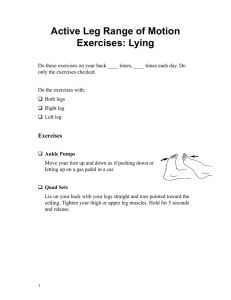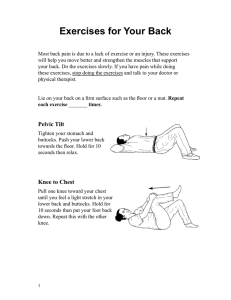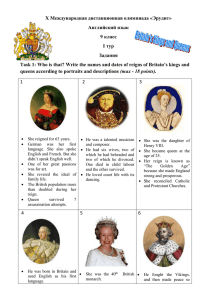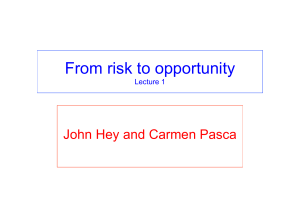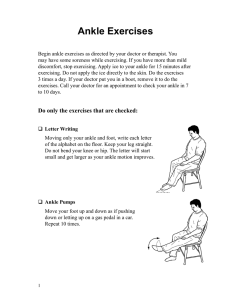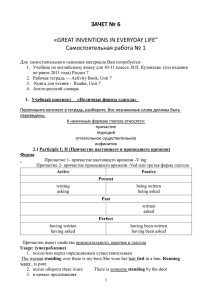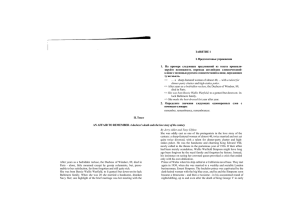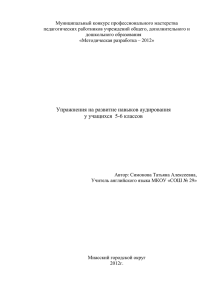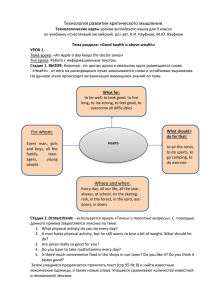***** 1 - teamlearning
реклама
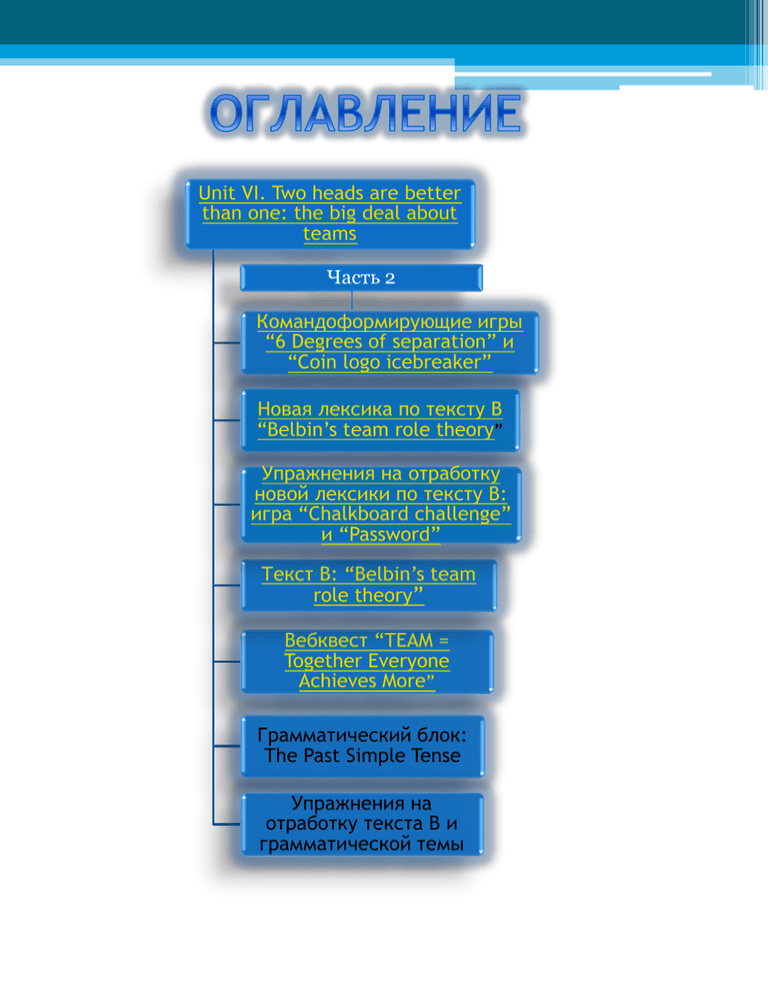
Unit VI. Two heads are better than one: the big deal about teams Часть 2 Командоформирующие игры “6 Degrees of separation” и “Coin logo icebreaker” Новая лексика по тексту В “Belbin’s team role theory” Упражнения на отработку новой лексики по тексту В: игра “Chalkboard challenge” и “Password” Текст В: “Belbin’s team role theory” Вебквест “TEAM = Together Everyone Achieves More” Грамматический блок: The Past Simple Tense Упражнения на отработку текста В и грамматической темы Unit VI. Two heads are better than one: the big deal about teams (Part II). The sixth unit is dedicated to various types of teams, team work and team building itself. Do you want to figure out how to cooperate with others effectively? Check it out! 1. Two team building games “6 Degrees of separation” and “Coin logo icebreaker”. 2. New words (Texts B “Belbin’s team role theory”) 3. Let’s play games “Chalkboard challenge” & “Password” 4. Text B : “Belbin’s team role theory” 6.WebQuest “TEAM= Together everyone achieves more” 5. Grammar Topic: The Past Simple Tense К ОГЛАВЛЕНИЮ 6. Drills & other exercises Two team building games “6 Degrees of separation” and “Coin logo icebreaker” 6 DEGREES OF SEPARATION * It happens all of the time, we meet someone who knows someone we know. It’s a small world, that’s for sure. The object of this game is to see how small the world really is. 1. First, find a partner. Introduce yourselves and make a list of 5-10 things that you have in common with each other: where you went to school, year you were born, number of years with the company, food likes, sports likes, etc. 2. Once you have completed your first list, you must find someone else in the room that also has one of those 5-10 things in common with you. When you have found that person, repeat step one with them and develop a new list. * По материалам пособия Zabriskie K. Creative icebreakers, Introductions, and Hellos, for Teachers, Trainers and Facilitators.- Port Tobacco, 2002. К ОГЛАВЛЕНИЮ 3. Repeat step two. 4. Continue until you have met five other people or time is called by the facilitator. 5. A prize will be given to the first person able to complete the game. When you are done, let the facilitator know that you have finished. Time You’ve got approximately 15-20 minutes for a game. Once most people have finished, your teacher calls time. COIN LOGO ICEBREAKER Your task is to produce a single team logo, themed according to the situation. 1. Put all pasteboard coins on the table. For the best performance you can use such additional items as: pens, phones, diaries, etc. to complete your logo. 2. Your team should guess the meaning of other teams’ logos, before the explanations. 3. Then your team will be split into two. Half leave the room while remaining half make their personal coin logos. Half return to room and try to match logos to people. К ОГЛАВЛЕНИЮ Materials Needed: A lot of pasteboard coins Time You’ve got approximately 20 minutes for a game. НОВАЯ ЛЕКСИКА ПО ТЕКСТУ B “BELBIN’S TEAM ROLE THEORY” BELBIN’S TEAM ROLES – командные роли Белбина It’s an approach to profiling people on the basis of personality types, to identify their strengths and weaknesses as the members of a team. К ОГЛАВЛЕНИЮ COORDINATOR [kəʋ’ɔ:rdə‚neɪtə] – координатор This is a team member, who delegates duties, clarifies goals and coordinates resources. TEAMWORKER [ti:m’wɜ:kə] – коллективист This is a team member, who builds bridges, fosters team spirit and calms rough waters. К ОГЛАВЛЕНИЮ IMPLEMENTER [’ɪmplə‚mentər] – практик This is a team member, who translates concepts into practical plans. PLANT [plænt] – генератор идей This is a team member, who proposes new ideas, solves difficult problems. К ОГЛАВЛЕНИЮ MONITOR [’mɒnɪtə] – аналитик This is a team member, who sees all options, evaluates ideas, judges correctly. SHAPER [’ʃeɪpə] – формирователь This is a team member, who gives coherence to team work, overcomes obstacles. К ОГЛАВЛЕНИЮ FINISHER [’fɪnɪʃə] – завершитель This is a team member, who searches out errors, keeps a feeling of urgency in the team, delivers on time. RESOURCE INVESTIGATOR [’ri:sɔ:s ɪn’vestə‚geɪtə] – исследователь ресурсов This is a team member, who explores opportunities, handles external contacts. К ОГЛАВЛЕНИЮ THEORY [’Ɵɪərɪ] – теория It’s a well-substantiated explanation of some aspect of the natural world. PATTERN [’pæt(ə)n] – образец, пример It’s a reliable sample of traits, acts, tendencies, or other observable characteristics of a person, group, or institution. К ОГЛАВЛЕНИЮ IMPACT [’ɪmpækt] влияние, воздействие This is a strong effect. BEHAVIOUR [bɪ’heɪvjə] – поведение This is an action or a reaction of something (as a machine or substance) under specified circumstances. К ОГЛАВЛЕНИЮ STRENGTH [streŋƟ] – сила, крепость It’s the property of being physically or mentally strong. PREMISE [’premɪs] допущение, предположение It means to take something as preexisting and given. К ОГЛАВЛЕНИЮ AWARE [ə’weə] знающий, осведомленный This is a term referring to the ability to perceive, to feel, or to be conscious of events, objects or patterns, which does not necessarily imply understanding. ABILITY [ə’bɪlətɪ] способность, возможность This is a quality that permits or facilitates achievement. К ОГЛАВЛЕНИЮ DEMAND [dɪ’mænd] требование, запрос This is an urgent request. ENVIRONMENT [ɪn’vaɪrənmənt] окружающая среда, окружение It’s the totality of surrounding conditions. К ОГЛАВЛЕНИЮ TRAIT [treɪt] характерная черта, особенность This is a distinguishing feature of your personal nature. DEFINE [dɪ’faɪn] определять, устанавливать It means to determine the essential quality or give a definition for the meaning of a word. К ОГЛАВЛЕНИЮ PERCEPTION [pə’sepʃ(ə)n] восприятие, осознание It’s awareness of the elements of environment through physical sensation. STATEMENT [’steɪtmənt] высказывание, заявление This is a message that is stated or declared. К ОГЛАВЛЕНИЮ MATURE [mə’tʋə] зрелый, сформировавшийся It’s a condition of full development. PAINSTAKING [’peɪnz‚teɪkɪŋ] – старательный, усердный It means to be characterized by extreme care and great effort. К ОГЛАВЛЕНИЮ УПРАЖНЕНИЕ НА ОТРАБОТКУ НОВОЙ ЛЕКСИКИ (ТЕКСТ B) 000 000 000 000 Chalkboard Challenge Vocabulary TEXT B “BELBIN’S TEAM ROLES” Для начала выполнения упражнения левой кнопкой мыши нажмите на картинку (“Password”). Перед Вами появится всплывающее окно «Оповещение системы безопасности». Вам необходимо выбрать опцию «Включить содержимое». ПЕРЕЙТИ К ИГРЕ “PASSWORD” A Vocabulary Review Activity Для начала выполнения упражнения левой кнопкой мыши нажмите на картинку (“Password”). Перед Вами появится всплывающее окно «Оповещение системы безопасности». Вам необходимо выбрать опцию «Включить содержимое». ПЕРЕЙТИ К ТЕКСТУ B “BELBIN’S TEAM ROLES” TEXT A: “BELBIN’S TEAM ROLE THEORY” Dr. Meredith Belbin is well known for his team role theory (1981). The team roles identified by Belbin are based on certain patterns of behaviour that people exhibit within teams. These patterns of behaviour can potentially have an impact on the performance of the team. The basic premise of the Belbin’s team roles theory is quite simple. When individuals become aware of their own strengths and abilities, and understand the role that he or she is capable of playing within a team, it helps them to deal better with the demands of the team environment. Belbin’s team roles are based on a study that examined personality traits, intellectual styles and behaviours within teams. The team roles evolved from the clusters or patterns of these that emerged during the study. Initially defined as 8 roles, the Belbin model now sports 9 roles, the new one being the ‘Specialist’. The 9 team roles are usually further classified into Action oriented, People oriented and Intellectual roles. Listen to the record to find out more: К ОГЛАВЛЕНИЮ Roles & Descriptions (http://www.belbin.com) К ОГЛАВЛЕНИЮ Analysis of Belbin Team Roles Belbin’s roles are identified based on a series of statements that constitute the ‘Self-Perception Inventory’ (SPI). The statements have to be answered by an individual based on personal perceptions of what he or she would do in different team situations. Based on the statements that you pick, and the weight that you assign to those statements, the final scores are computed. What you get is a score for each of the roles. The roles where you score high are the ones that define your natural inclination within a team. A person can have strengths in more than one role and deficiencies or weaknesses in many of the other roles. For instance, a person can be a good Implementer and a good Cocoordinator but a very poor Completer/Finisher. This means the individual’s natural inclination during teamwork is to facilitate interaction and decision making, that he or she is also capable of stepping in to translate the team’s decisions into reality. But on the flip side, the person may be lacking as far as attention to detail goes. К ОГЛАВЛЕНИЮ WEB QUEST “TEAM=Together Everyone Achieves More?” Description: this web quest is dedicated to conflicting views on team work itself and its effectiveness. It’s a known fact, that tastes differ and everyone has a right to own his unique opinion, check it out: FOR AGAINST “I like my work and my colleagues. I am happy to work in this team. We are young and ambitious. We can solve any problem, no matter how difficult it is. Team work is a great motivator to achieve more!” “Personally, I do not like working on team projects, especially ones that I worked on in high school. However, when it is required to work in a team, usually I try to lead.” To figure out more master the web quest! Task: you will need to research the most important issues directly connected with team work to understand you are for or against. Process: to complete this task you will take the following steps: 1. Look through the resources given below and pick the most important points, which help you to complete the worksheet. 2. Complete the worksheet individually. You will need to answer the questions properly, giving structured and supported answers. 3. When you complete your worksheet, you have to share your results with your teammates and choose the best variants from what you’ve got. Then you should complete team worksheet. 4. Present your results properly using the means of PowerPoint presentation. 5. Take part in group discussion supporting for or against opinion. К ОГЛАВЛЕНИЮ Resources: Evaluation: scores for complete individual and team worksheets, presentation of the results and final discussion will be used to evaluate you and your team for this web quest. INDIVIDUAL/TEAM WORKSHEET Name ___________________ Group ________ Team _______________________ / Group________ Questions: 1. What does the word “team” mean? _________________________________________________________________ _________________________________________________________________ 2. What is the difference between a team and a group? _________________________________________________________________ _________________________________________________________________ _________________________________________________________________ _________________________________________________________________ 3. How can 5 people, working together, produce more work than 5 individuals? How is it connected with such phenomena as trust, communication and pride? _________________________________________________________________ _________________________________________________________________ _________________________________________________________________ _________________________________________________________________ _________________________________________________________________ 4. What is Belbin’s team role theory? _____________________________________________________________________________________ _____________________________________________________________________________________ _____________________________________________________________________________________ К ОГЛАВЛЕНИЮ 5. Give a description of a team role “plant”? What are its strong and weak points? _________________________________________________________________ _________________________________________________________________ _________________________________________________________________ _________________________________________________________________ 6. Give a description of a team role “co-operator”? What are its strong and weak points? _________________________________________________________________ _________________________________________________________________ _________________________________________________________________ _________________________________________________________________ _________________________________________________________________ 7. Give a description of a team role “evaluator”? What are its strong and weak points? _________________________________________________________________ _________________________________________________________________ _________________________________________________________________ _________________________________________________________________ _________________________________________________________________ 8. Give a description of a team role “finisher”? What are its strong and weak points? _________________________________________________________________ _________________________________________________________________ _________________________________________________________________ _________________________________________________________________ _________________________________________________________________ 9. Give a description of a team role “implementer”? What are its strong and weak points? _________________________________________________________________ _________________________________________________________________ _________________________________________________________________ _________________________________________________________________ _________________________________________________________________ 10. Give a description of a team role “shaper”? What are its strong and weak points? _________________________________________________________________ _________________________________________________________________ _________________________________________________________________ _________________________________________________________________ _________________________________________________________________ К ОГЛАВЛЕНИЮ 11. Give a description of a team role “resource investigator”? What are its strong and weak points? ________________________________________________________________ ________________________________________________________________ ________________________________________________________________ ________________________________________________________________ ________________________________________________________________ 12. Give a description of a team role “team player”? What are its strong and weak points? ________________________________________________________________ ________________________________________________________________ ________________________________________________________________ ________________________________________________________________ ________________________________________________________________ 13. Is it enough to figure out your team roles to form a successful team? ________________________________________________________________ ________________________________________________________________ ________________________________________________________________ 14. What is Kersey’s temperament sorter? What is it for? ________________________________________________________________ ________________________________________________________________ ________________________________________________________________ ________________________________________________________________ ________________________________________________________________ К ОГЛАВЛЕНИЮ
